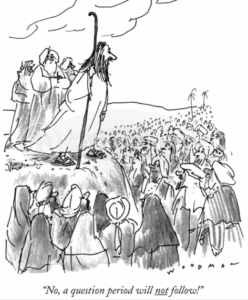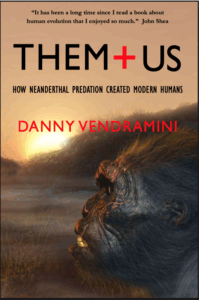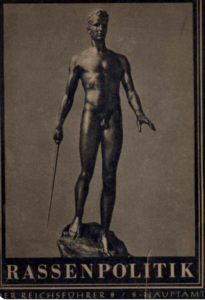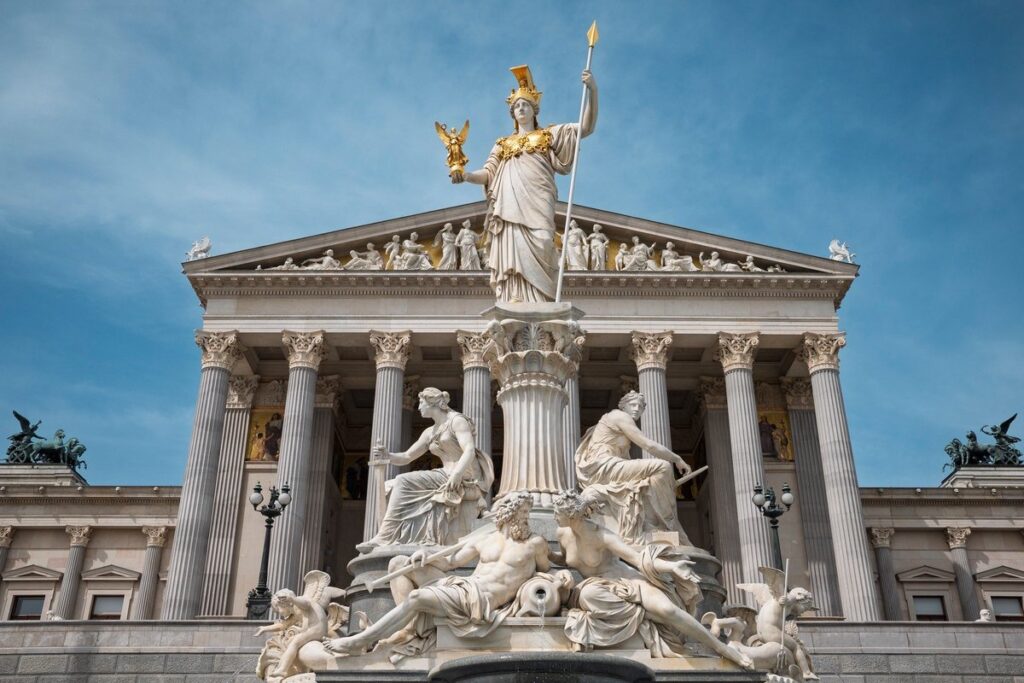Hail Pallas Athena, born from the head of Zeus,
Goddess of the city, giver of glorious victory.
Sermon
by Gaedhal
A Red Giant, to oversimplify, is a star that has lost its core, and this causes it to go hyper, such that it destroys planets astronomic units away.
The supernatural core of Christianity keeps it tethered to the social mores of the first century. Jesus and Saul are terminuses beyond which the inherent subversiveness of orthodox Christianity cannot go beyond.
However, when a Christian becomes a humanist, then he/she has slipped from orthodox Christianity’s moorings. The newly deconverted “humanist” now finds himself/herself on an open sea of utter craziness. It is like that clip of Rebecca Watson, where she says that whenever she deconverted from Christianity, she ipso facto became a humanist. It is almost as though “secular humanism” is just an aggressive form of Christless/Godless Christianity. “Secular humanism” is what is left when the myths and miracles have evaporated.
“Secular humanism” is like an axiological residue of Christianity.
When Christianity loses its supernatural core it goes hyper, and destroys habitats such as Rhodesia and South Africa, in the same way that the sun will destroy our earth, one astronomic unit away from it, when it goes hyper, in about 4 billion years. This is why I call it “atheistic hyper-christianity”. You [the editor of this site] call it neo-Christianity.
 I constantly see Leftist atheists trying to shame Christian Nationalists into being more Christlike, i.e. into adopting the suicidal teachings of the sermon on the Mount. As Ragnar Redbeard put it: the preachifier of the Sermon on the Mount is “the true crown prince of evil”. Ayn Rand also says that an enemy who destroys one is less evil than an enemy who convinces his victim to destroy himself. Jesus is the personage who persuaded the formerly white West to destroy itself, with suicidal teachings such as turn the other cheek; resist not evil; and welcome the xenos/stranger/foreigner.
I constantly see Leftist atheists trying to shame Christian Nationalists into being more Christlike, i.e. into adopting the suicidal teachings of the sermon on the Mount. As Ragnar Redbeard put it: the preachifier of the Sermon on the Mount is “the true crown prince of evil”. Ayn Rand also says that an enemy who destroys one is less evil than an enemy who convinces his victim to destroy himself. Jesus is the personage who persuaded the formerly white West to destroy itself, with suicidal teachings such as turn the other cheek; resist not evil; and welcome the xenos/stranger/foreigner.
Scrivener
Our PDF on neochristianity, which extensively quotes passages from Tom Holland’s book, Dominion, is central to understanding this site. Therefore, I was interested in watching this video defending Holland against the criticism of a secular humanist, Stephen Woodford, even though the video’s author, Glen Scrivener, is a Christian:
I discovered the video because Richard Carrier, whom I’ve been discussing recently, has tried (here)—like Woodford—to refute Holland with a string of strawman arguments!
That doesn’t mean I agree with everything the Christian Glen Scrivener says about the atheist Carrier, whom he calls an “incredible fringe historian” because Carrier doubts the existence of the historical Jesus. Nor does it mean I accept Holland’s neochristian morality, who, in one of the clips within the video embedded above, says that the Judeo-Christian idea of man created in the image of God has given dignity to humankind. (Savitri Devi has written that this Judeo-Christian idea has caused animal abuse in the West by considering every wingless biped on the planet as brothers, at the expense of animals.)
However, Glen Scrivener’s video is relevant in showing how secular humanists distort Holland’s thesis because they are deeply troubled, and feel threatened, by the idea that Christianity gave rise to the secular values of the West today.
Why does it bother them so much? (here we see another atheist in a series of videos strawmaning Holland by quoting the Old Testament when Holland is talking about the New Testament). Keep in mind that secular humanists are not Nietzscheans. If they were, instead of embracing today’s Western values—such as equality (see my recent instalment of Might is Right)—they would repudiate them.
Like Tom Holland himself, all these atheists who criticize Holland are actually neochristians. Glen Scrivener is not a neochristian but an Anglican Christian. On this site, we are against both, but more so against secular neochristians because they have taken Christian ethics to the stratosphere, as Holland aptly demonstrates in the final chapters of Dominion.
Recall this site’s seminal article metaphor of the Red Giant (neochristianity) star that burns up all the nearby planets: a metaphor for ethno-suicide throughout the West. For example, in the video Glen Scrivener said that out-group altruism originated in Christianity because it didn’t exist in pre-Christian times. What Scrivener omits is that this deranged altruism—which we call Jesus deranged syndrome—, is precisely what is causing the English roses of his country to be sucking the dicks of some orc migrants in this very moment.
Webbon’s
interview – 7
It couldn’t be clearer. Joel Webbon says that, although he acknowledges the racial factor, Christianity is the priority (“Christ first”). And he asks Nick Fuentes if he agrees with putting religion above the racial issue, which Fuentes accepts.
Shortly after, Webbon recounts the anecdote of Indian migrants in his Texan town sharing a public pool with his family. He had to explain to his daughter that even though they aren’t white, we should love them, and that their gods are evil.
Look at this inversion of values. Given that the gods of Hinduism were conceived by the Aryan conquerors before these guys mixed with the indigenous people, it could be said that there are still vestiges of the Aryan collective unconscious in present-day Hinduism, even though the original Brahmins (Aryans without a drop of Indian blood) are now extinct. That cannot be said of Judeo-Christianity, created by Semites. (Personally, I would consider the Greco-Roman pantheon as our legitimate Gods and the god of the Jews as an alien archetype.)
When this pair later discusses abortion, they both endorse the Christian doctrine on the sanctity of human life, without distinguishing in the slightest between an Aryan baby and a niglet.
Do you see why the Führer’s path is the only path? For National Socialists abortion was legal and moral for non-Aryans in Germany.
by Ragnar Redbeard
The Declaration of Independence commences by proclaiming an unctuous falsehood, a black, degrading self-evident lie—a lie which no one could possibly believe but a born fool. With insolent effrontery it brazenly proclaims as ‘a self evident truth’ that ‘all men are created equal’ and that they are ‘endowed,’ by their ‘Creator’ with certain ‘inalienable’ rights—rights which it thereupon proceeds to define in canting phraseology, imbecile and florid as it is false.
Indeed the mock-heroic preamble of this rhetorical pronunciamento is but a cunningly constructed piece of blague deliberately intended to deceive and betray. It consists of a patchwork of plagiarized catchwords, annexed wholesale from the ravings of seventeenth-century Levellers, crazed puritanic Mattoids and eighteenth-century cretinous French Jacobins—all mixed up and jumbled together with a long rigmarole of semi-meaningless pretty phrases, culled mostly from an old time melodrama.
The Declaration of Independence has less real meaning for present conditions than a bottled-up Indian war-whoop of the same period would have, if uncorked now. It is a back-number, musty, high smelling, and worm-eaten: only fit for the walls of a museum or the brain-cells of a daft philosopher.
Its ethical and most of its political conclusions are shams, deceptions, and cold-blooded dishonesties—incandescent Lies—glorified, belauded, printed in letters of gold, but nevertheless—Lies.
Indeed it has always been considered a piece of amusing mockery by those who really understood the secret intent for which it was originally constructed: viz:—as a lasso for the bellowing Herds, that, about one hundred years ago were beginning to run wild, and escape from their herdsmen, and herdsmen’s stock-whip, in this (then) boundless New World.
To all contemporary demagogues, the high-sounding phraseology of the ‘Declaration’ is as honey from paradise. Everywhere its seductive abstractions are the Avatars of anarchism, communism, republicanism, and scores of other zymotic convulsionisms. Why then should sane men continue giving lip-service to this subtle deception? Why should they, by their silence, acquiesce in the malefic efforts of organic weaklings, a mythical airy being who roams about Eternity manufacturing things out of no-things—a fable (instigated by prattlers of a false philosophy) to enforce by electioneering mass-pressure an impossible and hideous Equality Ideal?
Every national appeal is now made, not to the noblest and the best, but to the riff-raff—the slave-hordes—who possess less intelligence than night-owls. All that is brave, honourable, heroic, is ignored tacitly, for fear of offending the deified Herd—‘the Majority’. ‘Equality of conditions’ is its debasing shibboleth and verily he who has temerity enough to spit upon Equality is liable to be horned to death.
The ‘Voice of the People’ can only be compared to the fearsome shrieks of agony that may now and then be heard, issuing forth from the barred windows of a roadside madhouse. ‘The voice of God!’ Alas! Alas!
There are two methods whereby masterful ambitious men may hold any population in a state of ordered subjectivity. The first and by far the most honourable method is through an irresistible and highly-trained standing army, ready to deploy anywhere; with mechanical precision at a telegraphic nod in order to lay down the Law at the cannon’s mouth and sweep away all dangerous opposition.
The second and cheaper method is, first of all to inoculate those intended to be exploited with some poisonous political soporific, superstition [emphasis by Ed.], or theoria; something that operating insidiously, hypodermically, may render them laborious, meek, and tractable.
The latter plan has ever proved itself most effective because Aryan populations that would fight to the last gasp against undisguised military despotism, may be induced to passively submit to any indignity or extortion, if their brains are first carefully soaked in some abstract lie.
At the period of the war of Independence, North America was far too wide, far too sparsely settled, and far too poor in concentrated wealth to be effectively ruled and plundered upon the standing army principle: either by King George or the successful Junta of power-wielding revolutionists.
Hamilton, Hancock, Jefferson, Adams, Madison, Henry, and all the vested material interests that stood a solid phalanx behind those voluble patriots cast about for some safer method of ruling the minds of the uninformed but extremely valorous yeomanry, backwoodsmen and mountaineers.
After mature consideration they determined to lull and lure the armed peasantry back again into a condition of blissful somnolence, by instilling into their newly aroused minds, false but seductive political Idealisms, as subtle supplements to the fallacious, and equally delusive, (but pre-existent) religionisms and moralisms. This cunning plot worked like a charm, for Equity of Rights seemed to puritanic minds the logical outcome of that other hoary old lie—‘Equality before God’. [emphasis by Ed.]
Thereupon the sword of power, that conquered on the battlefield, was carefully hidden away out of sight and ‘constitutionalism’ invoked to aid in the re-harnessing of the conquerors of Cornwallis, by their new masters. The old systems of jurisprudence and government (founded on naked force) were cleverly retained even amplified and at the same time the white skinned populations were cunningly proclaimed ‘free and equal.’ Never having enjoyed genuine personal freedom (except on the Indian border) being for the most part descendants of hunted-out European starvelings and fanatics, (defeated battlers) they now stupidly thought that they had won freedom at last by the patent device of selecting a complete outfit of new tax-gatherers every fourth year.
When we look back upon the childlike faith in constitutionalism, displayed by our revolutionary Fathers together with their infantile republican specifics for the redemption of mankind, we cannot help smiling. At every general election, since 1776, Americans have voted solidly for increasing the despotic authority of their elective rulers and task-masters. Personal liberty is very nearly unknown (except in the newspaper) and any citizen who dares to think in direct opposition to the dogma of the Majority does so at the risk of his life, if he thinks too loudly.
Despotism, if it is to be overthrown, must be fought with its own weapons, and the vilest of Despotisms are ever founded upon Majority Votes.
Many years after the ‘Declaration’ was issued, our written Constitution was constructed with much voluble sophistry and mimic strife. That document, considered as a whole, is the most cunningly worded and at the same time most terrible instrument of Government and Mastership that any Anglo-Teutonic tribe has ever yoked itself up under. Pretending to ‘grant’ liberty and self-government, it practically annihilates both. Under the show of ‘guaranteeing’ personal independence and civil rights, it has organized an elective tyranny; wherein the mob-monarch possesses more arbitrary authority than any dynastic despot since the days of Darius or Balschazzar.
Under the hypnotic spell of a ‘free and equal’ dream, Americans have been hustled into a convict-prison of laboriousness to piratical masters a thousand times more terrible and more unyielding than any history can describe.
Even should America’s servile multitudes appeal to the arbitrement of physical force, they cannot possibly win. Possessing neither the strength, courage, brains, arms, money, nor leaders: they must be blown into eternal fragments by their master’s highly trained artillerists, and scientific destroyers.
The citadel of Power is now consolidated and prepared with the most improved armaments to repel any assault, no matter how well sustained. The nation is intersected in all directions, with iron highroads and splendid waterways, whereon armies and navies may be moved from city to city, with facility and dread effect. The War of Secession (or rather the war for the annihilation of self-government) demonstrated conclusively that a centralized authority, resting on herd-votes of the vulgar and fanatic is (in practice) military absolutism. There is no other Power in the land that can effectively hold it in check. The Czar of Russia possesses less actual authority than our Federal Government. With a standing army in the hollow of its hand, it can do exactly as it pleases, i.e. if it can collect enough revenue to purchase ‘statesmen’ and pay the salaries of its praetorian cohorts.
Most Americans are only now beginning to perceive these things, but they were foreseen, (and also foretold in part) by clear-sighted individuals before the Constitution itself was formally Enthroned.
What is viler than a government of slaves and usurious Jews? What is grander than a government of the Noblest and the Best—who have proved their fitness on the plains of death?
Cromwell and his Ironsides—Cæsar and his Legions shall be born again; and the thunderous tread of Sulla’s fierce destroyers shall roll and rumble amid the fire and glare and smoke of crumbling constitutionalisms: ‘as it was in the beginning, is now, and ever shall be’—warfare without end.
Yawping politicians may harangue base city mobs of hirelings and Christlings with ‘Alas, poor Yorick!’ rhapsody, as if struggle and strife were the evil of all evils. Figures of speech, however, cannot breathe the breath of life into feline philosophies that never have had the slightest foundation in Fact. The survival of the Fittest—the Toughest is the logic of events and of all time. They who declare otherwise are blind. The chief point is this: that Fitness must honestly demonstrate itself not by ignoble theft and theory but by open conflict as per Darwin’s law of battle.
Poison
“Even these white nationalists have Semitic poison in their brains…” —Thomas
Messala’s advice
 These days I’ve been reading a printed copy of Them and Us, which I used last year in its Kindle version for my excerpts from that book.
These days I’ve been reading a printed copy of Them and Us, which I used last year in its Kindle version for my excerpts from that book.
A common mistake among young Aryans who rebel against the System, even while admiring National Socialism, is wanting to imitate the men’s sports of the Third Reich.
I’ve often mentioned this moment of the 1959 film when Messala tells Sextus how to confront a Jewish idea that is infecting the Romans: with another idea!
The mistake of these young men lies in not knowing the saying, “For a stick to tighten, it must be made of the same wedge.”
We cannot move beyond the collective Jewish unconscious that has seized the Aryan soul with rough sports for Aryan men. We need to follow Messala’s advice. And to do so, it is necessary to become a philosopher, not in the way philosophy is understood in academia today, but in its ancient sense which implies questioning dogma.
There are several books that revolutionised my view of the world today. In my work on parental abuse of children, I have mentioned Alice Miller, whom I discovered almost a quarter of a century ago.
The next bibliographical milestone was two books by William Pierce: one fiction and one non-fiction, which I have mentioned countless times on this site. Pierce wasn’t a National Socialist, and I had to supplement his work with the memoirs written by Savitri Devi. Both authors address exterminationism.
After I had uploaded many hundreds of posts to The West’s Darkest Hour, I discovered Richard Carrier’s work on the highly dubious existence of the historical Jesus, which profoundly impacted my thinking because, since my early teens, I had been internally struggling with the Catholicism instilled in me by my father.
Last year, just when I thought my worldview was complete, I discovered Danny Vendramini’s book: a study of real prehistory which complements what Pierce wrote in his story of the white race.
We will never defeat the Jewish ideology that has seized our souls without these superb readings. It doesn’t matter that Miller, Carrier, and Vendramini are antagonistic to National Socialism. What matters is that it is perfectly possible to use their findings to further the National Socialist cause, as I have demonstrated on this site.
To young lads who believe that by practising rough sports in semi-secret societies—a healthy Männerbund—they will challenge the System, I suggest they follow Messala’s advice.
Become philosophers! Physical fitness is not enough.
A Rebuttal to
Carrier’s “Christianity in Hitler’s
Ideology: The Definitive Study”
by Völkisch Spirit ᚾ
 For those of you who may already be aware, on January 29th of this year Richard Carrier published an article on his blog entitled “Christianity in Hitler’s Ideology: The Definitive Study” that elucidates primarily on three books that deal with the question of Christianity in National Socialism. Carrier takes the position that it is ‘counterfactual’ to declare that National Socialism was an atheistic movement, and that in fact, National Socialism was “stalwartly and predominantly Christian” as he puts it.
For those of you who may already be aware, on January 29th of this year Richard Carrier published an article on his blog entitled “Christianity in Hitler’s Ideology: The Definitive Study” that elucidates primarily on three books that deal with the question of Christianity in National Socialism. Carrier takes the position that it is ‘counterfactual’ to declare that National Socialism was an atheistic movement, and that in fact, National Socialism was “stalwartly and predominantly Christian” as he puts it.
For a quick contextual preface, it is important to note that Carrier has predicated his argument on rejecting the notion that Adolf Hitler and National Socialism were products of atheism. While some Christians may take that position in order to pin the alleged atrocities of the Third Reich squarely on atheism (thus prompting Carrier’s rebuttal), both sides are heavily challenged by the evidence. National Socialism effectively rejected both atheism and Christianity in place of a folk-based nature religion steeped in mystical conceptions of blood and soil, race, and ancestral heritage.
In this article we will be examining, deconstructing and refuting the various claims from Richard Carrier to further substantiate the historical fact that National Socialism was fundamentally anti-Christian from its inception, and that the Gottgläubig (God-belief) concept within National Socialism was not only non-denominational, but inherently antithetical to any notions of the God of Abraham.
Let us begin…
______ 卐 ______
Read it all here.
Bitcoin
 “A cautionary tale. BTC is not money, nor credit. It is a bubble, a vol-au-vent, a tulip bubble without physical bulbs. Sadly, lots of innocent people have been sucked in”.
“A cautionary tale. BTC is not money, nor credit. It is a bubble, a vol-au-vent, a tulip bubble without physical bulbs. Sadly, lots of innocent people have been sucked in”.
Webbon’s
interview – 6
By discussing “cultural Christianity” almost from the beginning of the interview, Nick Fuentes and Joel Webbon seem to be getting closer to what we’ve been saying: that there is such a thing as secular Christianity (liberalism, or what we call “neochristianity”).
By minute 38, they both agree that to live in the new Christian Republic they envision in the US, you have to be a Christian. They ignore the fact that this very thing was already implemented in Constantinople, the so-called Second Rome. In a few centuries that town ended up as a melting pot of all the Mediterranean races! (Needless to say, for us in the new republic to be formed the requirement is that the citizen be of pure Aryan descent.)
Shortly after, Webbon says that Christianity is not a religion exclusive to white people, but for all people. That this pair’s thinking is medieval is evident when, after minute 52, they begin to discuss theologically who goes to hell.



